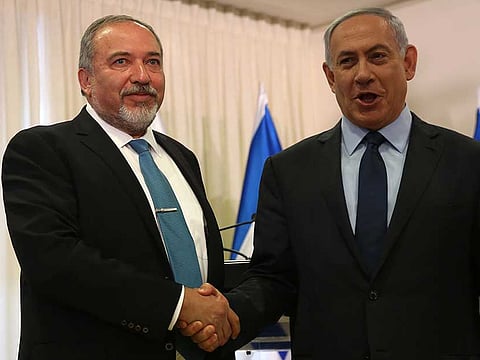The Netanyahu-Lieberman peace pretence
It will be too naive for one to believe that Tel Aviv’s renewed commitment to the two-state solution signals any genuine change in the Israeli leadership’s attitude

There are conflicting signals coming from Israel and they should not be underestimated. Prime Minister Benjamin Netanyahu has broadened his right-wing coalition cabinet by inviting a political foe, Avigdor Lieberman, to join as Defence Minister — a move that drew criticism from inside the government. Lieberman, head of hardline nationalist party Yisrael Beitenu, is a controversial figure in Israeli politics, known for his acidic attacks on Palestinian leader Mahmoud Abbas and for supporting Jewish colonists in the West Bank. But it was surprising that after a stormy confirmation session by the Knesset last Monday, Lieberman, along with Netanyahu, announced their commitment to the two-state solution and their willingness to negotiate with the Arab states over the Arab Peace Initiative of 2002.
Netanyahu said that he was ready to negotiate provided alterations are made to that initiative so that they reflect the dramatic changes in the region. But he underlined the agreed goal of two states for two peoples. Lieberman, on his part, added that President [Abdul Fattah] Al Sissi’s speech [last May] was very important and created a genuine opportunity. Al Sissi had urged Israel to resume talks with the Palestinians and neighbouring states. He also supported the French peace initiative, which Netanyahu had repeatedly rejected.
The new alliance between Netanyahu and Lieberman came as a surprise especially that the former was negotiating with the centre-left Zionist Union leadership to join his coalition. It is not known how long the Netanyahu-Lieberman partnership will last, or if the two men can actually work together. Political circles in Israel are already talking about early elections.
Netanyahu had rebuffed French efforts to tout an initiative to resume stalled peace talks with the Palestinians. The Israeli premier insisted that only direct negotiations, which Abbas rejects, can pave the way for a mutual settlement. Israel wants to avoid international involvement in peace talks that will put pressure on its negotiators or curtail its plans to fatten colonists in the West Bank and occupied East Jerusalem.
The Arab League supported the French initiative in its meeting last week, which was attended by Abbas who said that he was ready to accept a “fair and just peace” based on internationally-recognised United Nations resolutions in accordance with the Arab peace initiative. He also said that he will attend the planned peace conference in Paris today.
It is not clear, though, why the French continue to push their idea forward even when Israel has insisted that it is not interested. The United States reluctantly supported the French initiative and US Secretary of State John Kerry said he will attend the Paris meeting. That meeting is unlikely to succeed in re-launching the peace process, but it could distance Washington further from any involvement in brokering future talks between Israel and the Palestinians.
This leaves us with the Egyptian call and Netanyahu’s positive response to it. It opened suggestions that Cairo may hold its own peace conference with Arab participation. Netanyahu and Lieberman hope to re-negotiate the Arab Peace Initiative so that normalisation of relations with Arab states can begin even before a peace deal is reached. As it stands, the initiative offers Israel full diplomatic relationship with the Arab world in return for its withdrawal from occupied land and recognition of an independent Palestinian state with occupied East Jerusalem as its capital. For years, Israel had ignored that historic initiative and implemented plans to break up West Bank territory and create de facto borders by building a barrier wall.
There is no doubt that the Palestinians were among the primary victims of the so-called Arab Spring. Regional and world attention had shifted from their plight under Israeli occupation to bloody civil wars ravaging Syria, Libya, Iraq and Yemen. The tumults in Egypt, following the January 25 uprising, have reduced Cairo’s regional leverage, putting an end to Egypt’s mediation efforts between Abbas and his Hamas rivals in Gaza. These events allowed Netanyahu, who ruled over Israel’s most right-wing government, to tighten the economic stranglehold on Gaza, neutralise the influence of Abbas and his Palestinian National Authority, while expanding colonies in the West Bank and Gaza.
The French may have their own reasons for offering their services as interlocutors, especially as the US pivots from the region and in the light of US President Barack Obama’s personal dislike for Netanyahu, but it will be naive to believe that Israel’s renewed commitment to the two-state solution signals genuine change in the Israeli leadership. Instead, one should be suspicious of the latest Netanyahu-Lieberman statements. Both will like to make gains to cultivate their political careers. Neither is in a position to make the kind of historic compromises that are needed to achieve a just and lasting peace with Palestinians.
On the other hand, the Palestinian leadership finds itself in increasingly dangerous territory. Divisions between Hamas and Fattah have frustrated the Palestinian people, who are now looking for a new leadership and to move away from the gloomy status quo. But they should be careful not to allow Israel to impose the will of its new leadership on the people of Palestine. A political vacuum in Palestine will almost certainly give the dangerous duo of Netanyahu-Lieberman the opportunity to bury the Palestinian cause once and for all.
Osama Al Sharif is a journalist and political commentator based in Amman.


